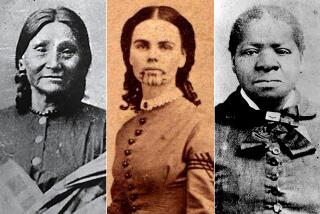Donner Saga Sidesteps Cannibalism : Television: ‘One More Mountain,’ airing Sunday, explores the courage of pioneers as they crossed the Sierra Nevada.
- Share via
“One More Mountain,” a TV movie airing at 9 p.m. Sunday on ABC, is about the ill-fated 1846 Donner Party, many of whom resorted to cannibalism to stay alive after they were trapped in the Sierra Nevada mountains during the harsh winter.
It is not, however, about cannibalism.
“People tuning into our show will be a little disappointed if they come looking for that,” said star Meredith Baxter. “We are the people who didn’t eat people.”
“One More Mountain” focuses on the Reed family, part of a small group that separated from the original 86-member party and did not revert to cannibalism. Baxter and Chris Cooper play Margaret and James Reed, co-founders of the Donner Party that was heading west for California.
The wealthy Reeds and their four children were resented by the rest of the wagon train, which was composed mostly of Irish and German immigrants. They considered Reed arrogant and chose Reed’s friend, George Donner, to lead them.
When the wagon train got snowed in, Reed vowed to make it to California to gather supplies and return with a rescue party. Margaret and a few other families decided not to continue with the Donners and, instead, waited several miles away in a camp beside a lake. They survived the numerous blizzards by eating hides and drinking glue.
Making “One More Mountain” in frigid Calgary late last year was an arduous task for the cast and crew.
“It was bloody cold,” Baxter recalled. “We were outside 97% of the time. We had our big warm boots, our big warm jackets and we could go inside our motor homes and craft services would bring us coffee. We still froze.”
“I guess the most difficult to shoot were some of the night scenes,” Cooper said. “We had to behave as if it were a summer evening. It was a bit of a trial for the camera people to disguise the smoke coming out of our mouths. We had to stop the chattering and shaking for that scene, which probably involved five hours being out there.”
Still, said director Dick Lowry, “everybody in the cast and crew took up the challenge in a wonderful way. Nobody was inclined to complain because you felt silly complaining in the face of knowing what the real people had done. I told somebody we were kind of like the postman: neither rain nor sleet nor dark of night would keep us from shooting this movie.”
The aristocratic Margaret is a far cry from Elyce Keaton, the thoroughly modern wife and mother Baxter played in the 1980s on the sitcom “Family Ties.” The actress acknowledged she had a difficult time portraying a 19th-Century woman who had no input in her husband’s plans to uproot their family from Illinois to go West.
“I guess I have made that journey in my life not to be someone who goes ‘OK,’ to one who will be somebody who will fight for what I want and figure out what I want and then make a stand for it,” she said. “I felt it was such a regression. The men were moved by such lust for adventure to be the first ones out there. Even in the face of incredible discomfort and hardship, they did it anyway.”
*
Producer John Kuri (“Conagher”) endured his own trials in getting the film made. A history buff, Kuri spent the better part of the last decade trying to bring the Reeds’ story to the screen.
“What always drew me to developing the story initially was the amazing thought of Margaret Reed being left with her four children while James is off trying to get back, and that enormous guilt he had to have felt,” Kuri said.
“It was his dream which put them where they were. But Margaret never lost sight of her beliefs. She just absolutely knew her children would survive and, knowing that, she knew she didn’t want them to live with the horrible memory of eating human flesh. That emotional strength she gave her children is what kept them alive.”
Kuri had numerous conversations with networks about the project. “Sometimes I would have an audience that would be receptive to it, but I’d have an encounter that it was not commercial enough or someone would want to exploit the sensationalistic side.”
But Kuri refused to allow his Reeds’ story to become “Alive II.” In fact, cannibalism is only mentioned twice in the movie. “This is not what the story is about. It’s a love story. It’s a story that has a lot of spiritualism to it. It’s the kind of thing that should encourage people.”
More to Read
The complete guide to home viewing
Get Screen Gab for everything about the TV shows and streaming movies everyone’s talking about.
You may occasionally receive promotional content from the Los Angeles Times.







